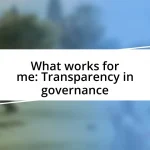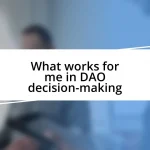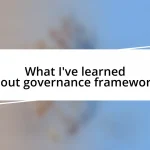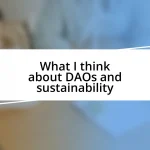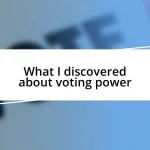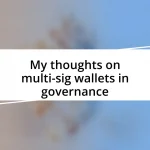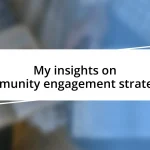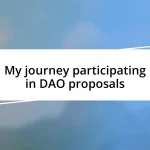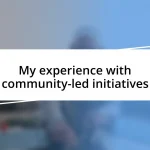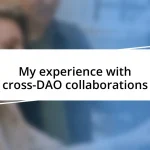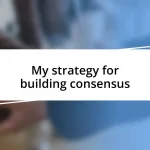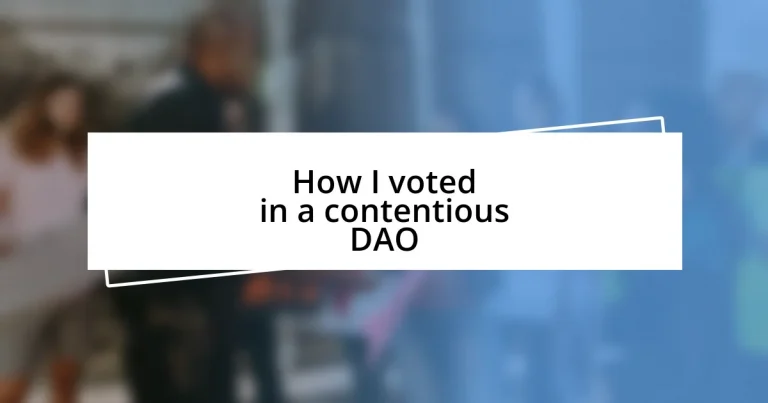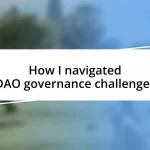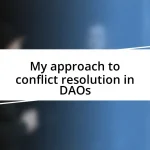Key takeaways:
- Voting in DAOs empowers members, fostering a strong sense of community and personal investment in organizational decisions.
- A comprehensive approach to researching proposals and engaging in discussions enhances informed decision-making and encourages diverse perspectives.
- The voting process is an ongoing dialogue, requiring reflection on outcomes and continued engagement to nurture the community’s goals and vision.
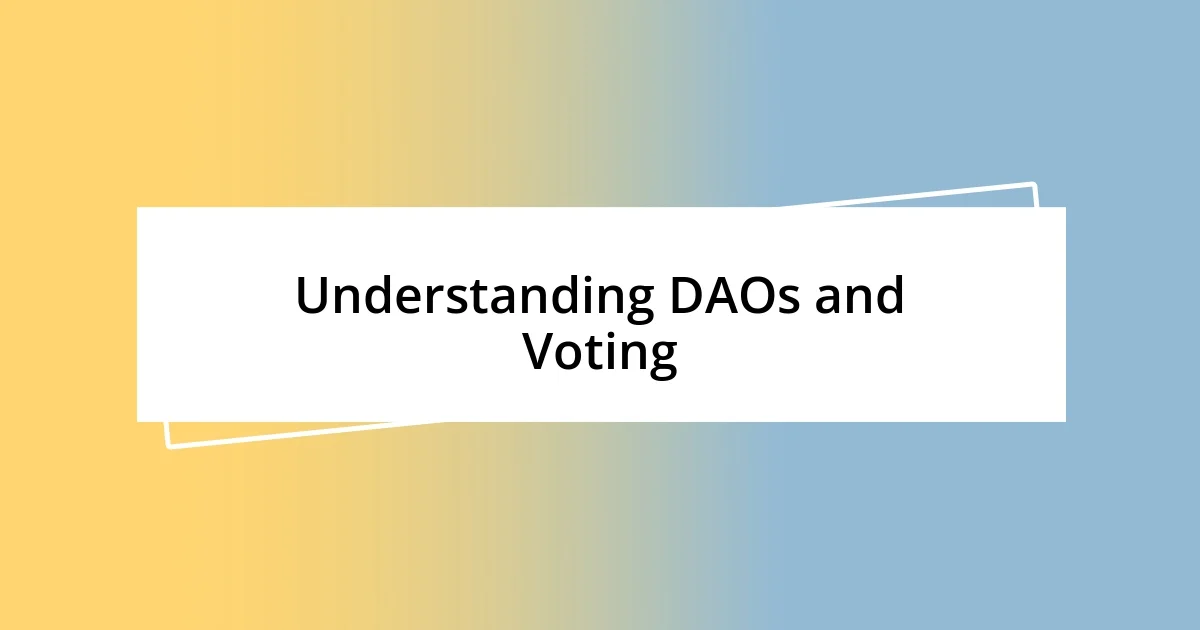
Understanding DAOs and Voting
DAOs, or Decentralized Autonomous Organizations, have revolutionized the way we think about governance and participation. I still remember the first time I participated in a DAO; the thrill of knowing my vote truly mattered in a community-driven project was exhilarating. How often do we get to exercise such agency in traditional organizations?
Voting within a DAO is unique because it often incorporates blockchain technology, ensuring transparency and security. I recall feeling a sense of responsibility as I reviewed proposals—weighing the pros and cons felt like stepping into a political arena where every voice counts. Isn’t it fascinating how this system lets individuals from around the globe come together to shape decisions collaboratively?
The process can be complex, especially when navigating different voting mechanisms like quorum requirements and weighted voting. Many times, I’ve found myself pondering the nuances of my vote. Am I aligning with the majority, or am I advocating for a change that might seem unconventional? This duality often makes DAO voting not just a task but a genuinely reflective experience.
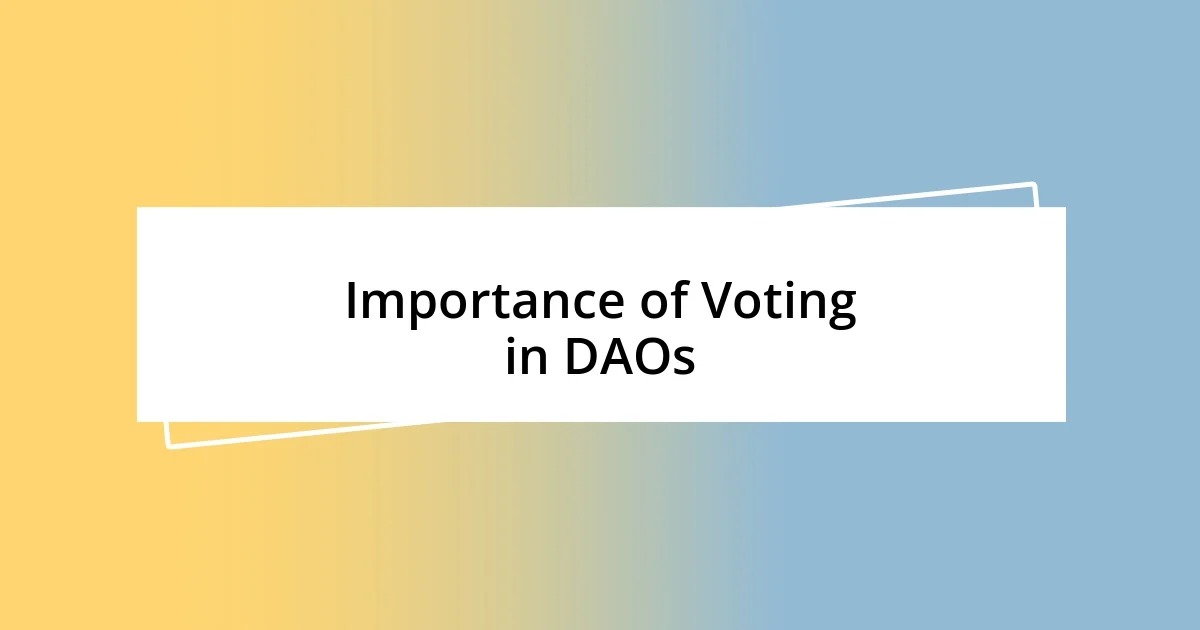
Importance of Voting in DAOs
Voting in DAOs is crucial because it gives every member a tangible voice in shaping the direction of the organization. I can still feel the anticipation the first time I cast my vote in a heated proposal; it felt like standing on the precipice of change. Each vote not only influences outcomes but also fosters a sense of ownership and community among participants.
- It fosters accountability, as members are more likely to remain engaged if they understand their role.
- Voting helps ensure that diverse perspectives are considered, promoting inclusivity and innovation.
- It encourages active participation, which can strengthen community ties and build trust among members.
- Each decision reflects the collective wisdom of the community, helping the DAO evolve in ways that may not be possible in traditional governance structures.
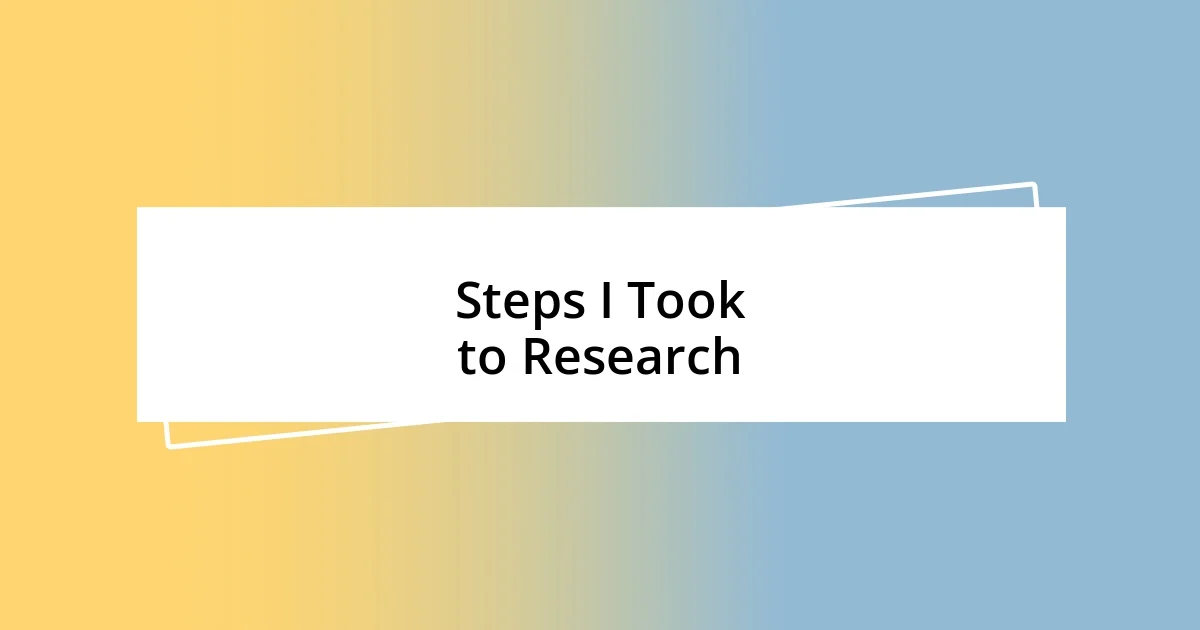
Steps I Took to Research
To prepare for voting in a contentious DAO, I started by digging deep into the proposals at hand. I didn’t just skim through them; I thoroughly analyzed the implications behind each suggestion. Visiting the DAO’s forum, I absorbed varying opinions from other members, taking careful notes on the arguments that resonated with me. This approach felt like assembling pieces of a puzzle, helping me visualize how my vote could help shape the outcome.
Next, I sought out resources outside of the DAO. I read articles and conducted interviews with experienced members to gain a broader perspective on the issues. It was enlightening to hear their stories and experiences. Their insights gave me the confidence to approach the voting process with a more informed mindset. It was a bit like going to a friend for advice before making a big decision—having that external validation made a world of difference.
Finally, I reflected on my values and priorities. I asked myself how each proposal aligned with my vision for the DAO. This introspection was essential, allowing my vote to reflect not only knowledge but also my personal beliefs. I realized that voting isn’t merely about the immediate outcome; it’s a commitment to the future direction of the community. I felt fully engaged and truly motivated to participate.
| Research Method | Description |
|---|---|
| Internal Analysis | Dug deep into proposals, absorbed opinions from members. |
| External Resources | Read articles and conducted interviews for broader perspectives. |
| Personal Reflection | Aligned proposals with my values to inform my vote. |
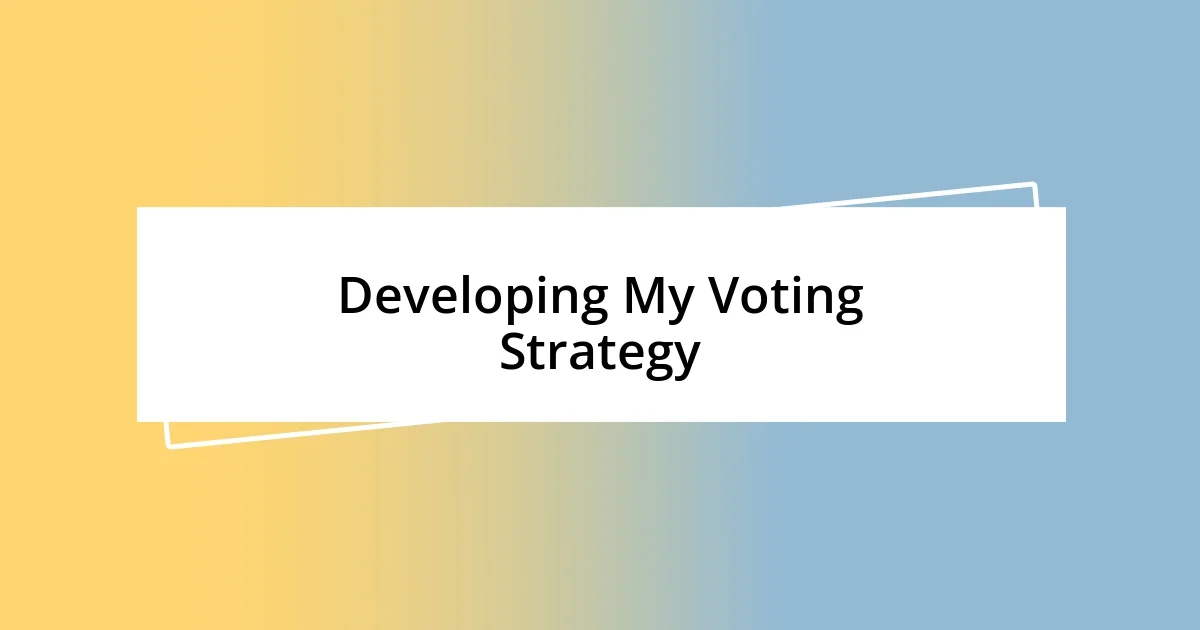
Developing My Voting Strategy
When developing my voting strategy, I found it essential to create a clear hierarchy of what mattered most to me. I vividly recall the moment I sketched out my personal criteria on a notepad, outlining priorities like transparency, community impact, and alignment with my vision. It struck me how vital it was to not just react to proposals but to have a consistent framework guiding my decisions.
As I delved deeper into the discussions within the DAO, I stumbled upon contrasting opinions that challenged my initial stance. It was during a particularly fiery debate that I realized how often we become attached to our viewpoints. I asked myself, “Am I really listening to understand, or just waiting to respond?” This realization pushed me to engage more empathetically, allowing me to incorporate diverse perspectives into my strategy, which ultimately enriched my decision-making process.
I believe that cultivating an adaptable mindset is crucial in contentious environments. There was a time when I felt stuck on a specific proposal, convinced I knew the best path forward. However, after reflecting on feedback from fellow members and the feelings it provoked, I learned the importance of flexibility. Being open to adjusting my strategy not only broadened my understanding but also made me more aligned with the collective goals of the DAO. How could I expect to influence outcomes if I wasn’t willing to evolve alongside the community?
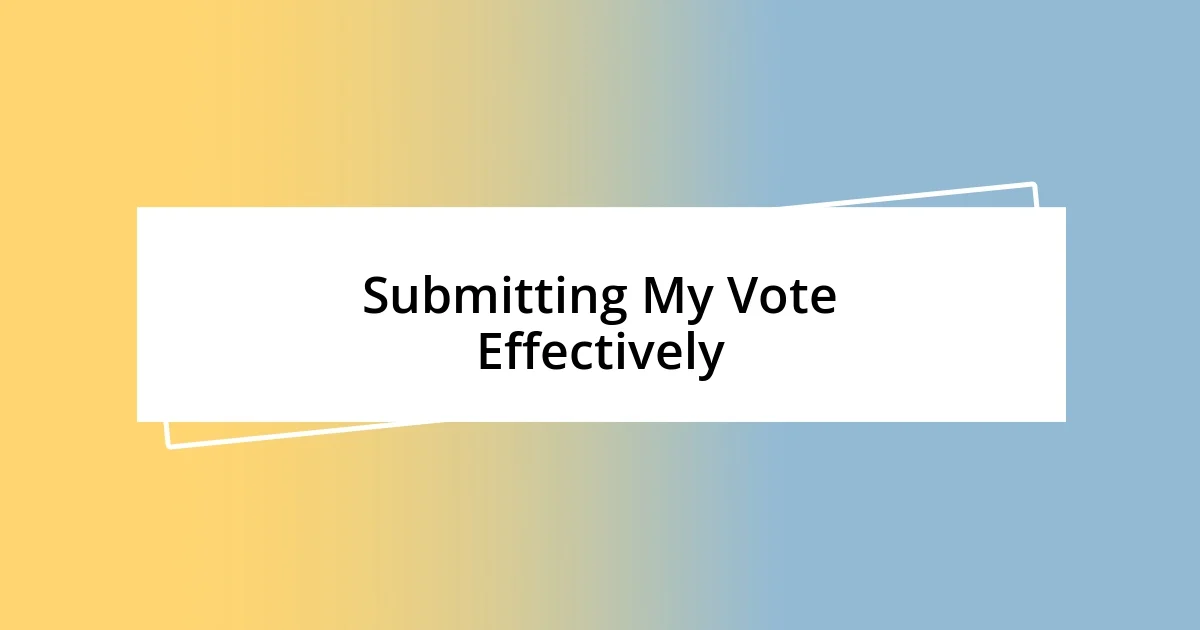
Submitting My Vote Effectively
Submitting my vote was a moment filled with anticipation. I recall sitting at my desk, staring at my screen, and feeling both excitement and a touch of anxiety about pushing that submit button. I wanted to ensure my vote truly reflected my research and strategic approach. So, I double-checked everything: the proposal details, my notes, and how it aligned with my deeper values. It wasn’t just a quick click for me; it felt like my voice mattered, and I needed to be deliberate about it.
To make the process smoother, I created a checklist of key elements I had identified throughout my research. This checklist acted like a roadmap guiding my vote. I found it incredibly useful to have this physical representation on my screen; it reminded me of the weight of my decision. Did you ever feel overwhelmed by too many choices? I know I’ve been there! That’s why having those pivotal points clearly outlined helped me cut through the noise and focus on what mattered most.
After I submitted, a wave of relief washed over me, yet I couldn’t shake the feeling of lingering curiosity. I asked myself how my choices would play out in the broader context of the DAO. Would my vote spark positive change or inadvertently steer us off course? It was a fascinating moment of reflection, realizing that voting isn’t just a task to complete; it’s an ongoing dialogue with the community. And in that moment, I felt proud to be part of something bigger than myself, knowing my voice contributed to a collective decision.
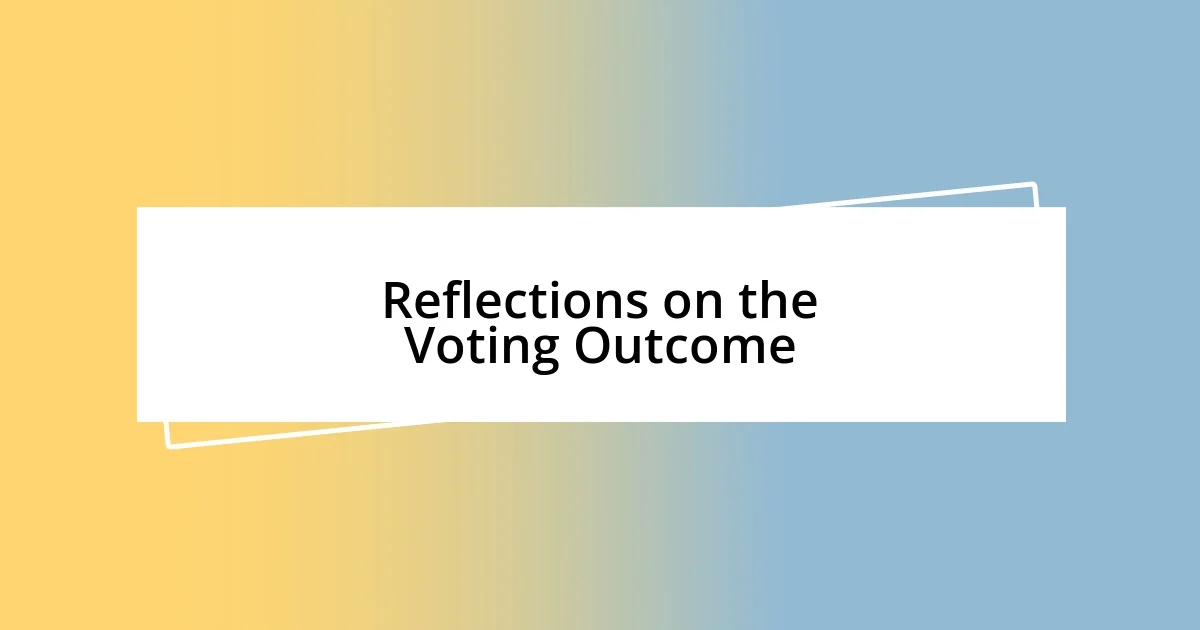
Reflections on the Voting Outcome
Reflecting on the outcome of the vote stirred a mix of excitement and concern within me. When the results were announced, my heart raced as I processed the implications of the collective decision. Did the outcome align with my vision for the future of our DAO? Seeing the community’s reaction unfold was a reminder that each vote we cast is a thread in the larger tapestry of our shared goals. It drew attention to the reality that decisions made today could ripple through our community for years to come.
As I analyzed the voting results, I couldn’t help but feel a sense of responsibility. Each number represented real people with real values and aspirations. I think of how passionately I had advocated for certain aspects during the discussions—did those efforts resonate or fade into the background? This reflection brought me back to my commitment to engage with every member, understanding their concerns and perspectives. It’s easy to feel isolated in our opinions, but the results underscored the importance of consensus and the need for open dialogue.
In the aftermath, I found myself contemplating whether the winning proposal truly embodied the collective vision we had collaboratively sought. Was it a step forward or a detour? The experience has taught me that voting is not the conclusion of dialogue; rather, it opens the door to deeper engagement. Just like planting a seed, I realize that nurturing the outcome requires continued effort. How will we work together to ensure our chosen path flourishes? That question gnawed at me, motivating me to connect with others and explore how we, as a community, can further elevate our mission.
